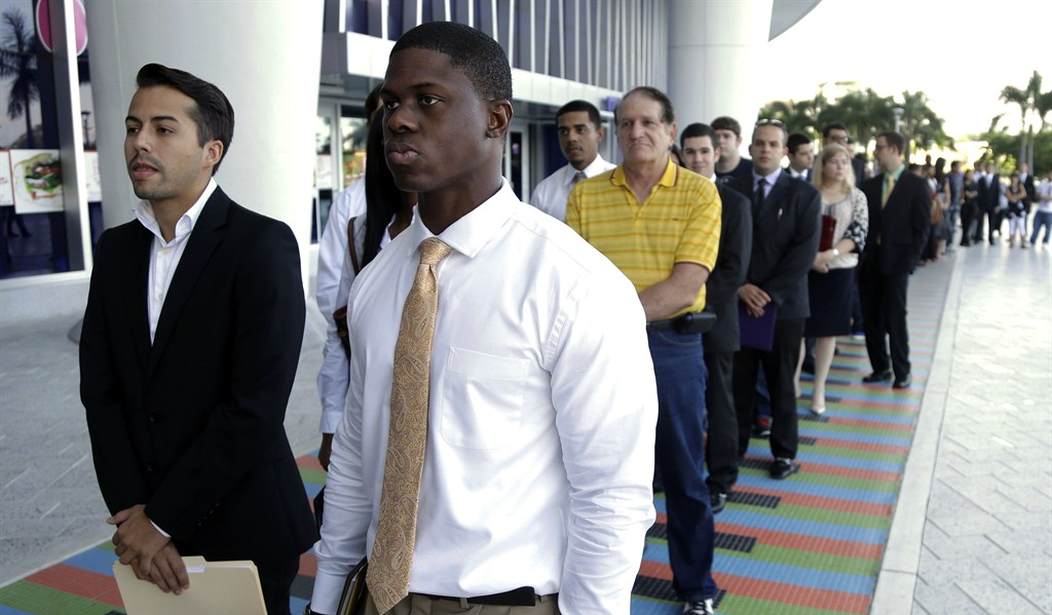WASHINGTON - Liberal pundits are gushing over last week's job report, hoping it will give President Obama and his party the political boost they need to avoid yet another devastating defeat in the midterm elections.
After nearly five and a half years of a job-challenged, sluggish economy that all but stopped growing in the last three months, they're hailing the Labor Department report as the long-awaited antidote to the Democrats' deepening political troubles.
"If they aren't exactly popping champagne corks over at the White House, at the very least there's surely a sigh of relief, and a renewed hope" that Democrats might head into November with a better narrative about the economy," writes Washington Post blogger Paul Waldman.
"For Democrats desperately in search of a way to change the national political environment in advance of the November election, the surprisingly strong April jobs report represents a ray of light," cheers the Post's election tracker Chris Cillizza.
Then there's this analysis from the Post's chief political reporter, Dan Balz:
"Friday's jobs report from the Bureau of Labor Statistics suggested that the economy roared into a different gear last month, adding 288,888 jobs."
The Obama economy "roaring"? Even a cursory review of the job numbers revealed that beneath the statistics this report showed fewer people were working, not more. This is an economy struggling on many levels, one that Fed Chairman Janet Yellen says is still stuck in a recovery and will likely remain so for the next year or more.
Balz's analysis, which ran under the headline, "Will the jobs report give Democrats a political boost?", said the number of jobs created last month was "the best single month of job growth since January 2012."
Recommended
"The unemployment rate plunged, from 6.7 percent to 6.3 percent," he said, adding that the jobless rate is "now 1.2 percent lower than it was a year ago and the lowest since September 2008..."
But the number of jobs created last month came with a lot of caveats. It was nowhere near the 350,000 a month full-time jobs the economy needs to bring unemployment down to normal levels anytime soon, economists say.
We are in the sixth year of one of the longest recovery periods ever -- when the average length of all post-war recessions has been about two years. And don't think the voters haven't noticed this.
In the Reagan years, we came roaring out of the 1981-82 recession with monthly job numbers in the 350,000 to 400,000 range and higher. In September, 1983 alone the economy produced more than one million jobs. The jobs the Obama economy's been racking up are nowhere near those levels.
Yes, the unemployment rate has fallen, but the number of new jobs created had absolutely nothing to do with that -- as Balz acknowledges in the 10th paragraph of his story. The jobless rate fell only because over 800,000 Americans dropped out of the labor force, he noted, and thus are no longer counted among the unemployed.
The Post seems to have trouble with this fact in some of the stories it's run since last Friday. "The jobless rate plunged [to] its lowest level since 2008 -- though part of that was due to workers leaving the labor force," the newspaper said in its business pages Sunday.
No, not "part of that," all of that.
Former Obama administration economic adviser Jared Bernstein tells us that April's "decline in unemployment is entirely due not to job creation, but to labor force decline," adding that "employment actually fell slightly" in BLS's household survey.
Economist Dean Baker, co-founder of the liberal-leaning Center for Economic and Policy Research agrees.
The drop in unemployment "was entirely the result of 806,000 people leaving the labor force. Employment as measured in the household survey actually fell by 73,000," Baker writes.
There were 484,000 fewer workers younger than 25 in the April job numbers, and more than 800,000 fewer total workers, the Post's economics writer Ylan Q. Mui reported Saturday.
The labor force participation rate for younger workers between the ages of 16 to 19 is at "its second-lowest level ever," Mui reported.
To suggest, or even intimate, that one month's numbers, which came with a sea of negative data, was going to be a political game changer is the height of wishful thinking.
The stock market responded to the jobs report with a big yawn, with the Dow dropping 46 points Friday. Its been on a downward slide ever since. The "job gains failed to impress investors," the Associated Press said.
Little news media notice was given to the kind of jobs being created last month and the relatively tiny numbers in each of the sectors. The construction industry added only 32,000 jobs, while the professional and business services sector added 75,000 net jobs in a nation of more than 150 million workers.
Retailers, bars and restaurants each added more than 30,000 jobs, but these are among the lowest paid sectors in the economy, many involving only part-time work and certainly not a sign of robust, good paying job growth that in any way suggests the economy is turning around.
Seasoned labor force experts were not at all impressed by the job numbers and bluntly said so.
"I would say that this big drop in the unemployment rate is not consistent with a really robust labor market because that labor force participation rate did not rise, and the employment-to-population ratio is shockingly low," said Tara Sinclair, a professor of economics at George Washington University.
The White House thinks that if they can get the news media to report that the economy is growing stronger, the voters will begin to believe it.
Tell that to the millions of long term, unemployed people who've stopped looking for work because they can't find a full-time job They know better.

























Join the conversation as a VIP Member